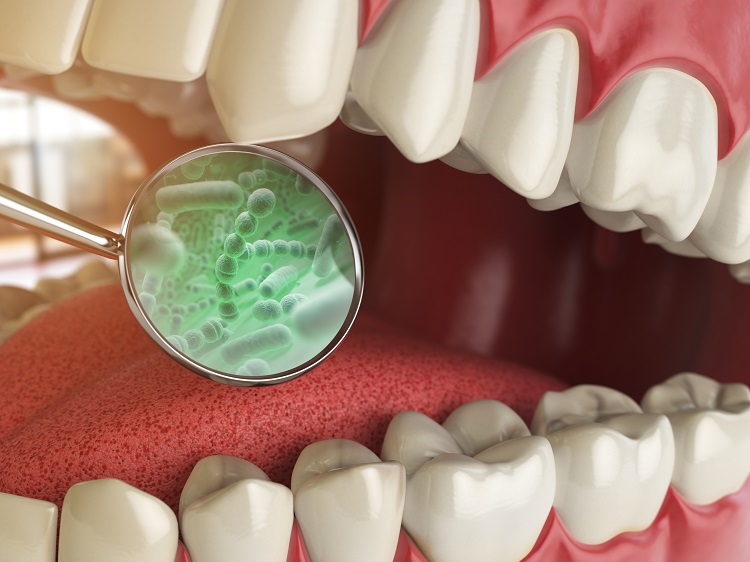Molar cavities: Causes and Prevention
The first sign of molar cavities is the appearance of tiny holes in the surface of the teeth, which then spread into dark brown patches and gradually eat into the pulp. Understanding the causes of tooth decay, you will know the prevention to keep your teeth healthy.
Causes of molar cavities

Our mouth is home to a variety of bacteria. There are hundreds of different types of bacteria that live on teeth, gums, tongue and other areas in the mouth. While some types of bacteria are helpful, most of them are harmful, playing a major role in causing molars cavities.
Throughout the day, a “tug of war” takes place inside our mouths. These include dental plaque, bacteria along with foods or drinks that contain sugar or starch (such as milk, bread, cookies, candy, juice, etc.). Whenever you eat or drink something that contains sugar or starch, bacteria will take that as a raw material to produce acid. These acids begin to erode the surface of the teeth as well as the enamel.
Then the minerals in saliva (such as calcium, phosphorus) and fluoride from toothpaste, water, and other sources help enamel repair itself by filling up the minerals lost during the “invasion” of acid.
The following factors are what mainly cause molar cavities:
- Poor oral hygiene: Not frequently or improperly brushing your teeth will cause plaque to build up and erode the enamel.
- Plaque formation: Plaque occurs when bacteria, acids, food particles, and saliva combine together in the oral cavity. Plaque forms on your teeth and builds up over time. The acids in plaque attack tooth enamel and eventually cause holes in your teeth, also known as cavities.
- Dry mouth: Saliva helps to clean plaque on teeth. If you have dry mouth, which means your mouth produces a very little amount of saliva, the plaque can build up faster.
- Eating and drinking: This is the root cause of cavities. We all have to eat and drink to live, there is no way to avoid this. However, daily eating plays an important role in the formation of tooth decay. When you eat or drink, carbohydrates remain unless you brush your teeth. Even after brushing, you may still not completely remove food particles or carbohydrates. Thus, the risk of tooth decay increases.
- Bacteria and acids: While most people do not want to think about bacteria and acids, they still live in your mouth. When these bacteria digest carbohydrates that exist on teeth, gums, and tongue can cause acids.
- Medical problems: Some diseases (such as gastroesophageal reflux disease) cause acid from the stomach to flow back into the mouth, which in time will cause tooth decay. Similarly, anorexia nervosa increases the risk of tooth decay when your teeth come into contact with stomach acid (since you overeat, it is easy to vomit). In addition, some types of cancer treatment cause radiation to the head and neck, affecting the process of saliva production, thereby promoting the growth of bacteria in the oral cavity.
Signs and symptoms

As cavities progress, symptoms begin to appear. If you notice any of the following signs and symptoms, see your dentist as soon as possible:
- Pain: Pain is one of the most common symptoms of tooth decay.
- Sensitive teeth: You will feel tooth sensitivity to hot, cold, sweet, and sour foods or drinks.
- Pus in the teeth: this is the most serious and obvious symptom of tooth decay.
- Cavities form in teeth: Sometimes the holes are only seen if dental X-rays are taken.
- The surface of teeth (both inside and outside) turns brown or black.
Complications of molar cavities

If not treated promptly, tooth decay can lead to dangerous complications such as:
- Tooth enamel is destroyed: When the cavities destroy teeth and erode enamel, dentin will expose and teeth become sensitive.
- The dental pulp is infected: leading to abscesses and swollen root, causing bad breath.
- Severe cavities: will destroy alveolar bone and affect the adjacent teeth.
Treatment for molar cavities

Depending on the severity of the condition, the dentist will recommend the appropriate treatment. Some common methods are:
- Fluoride treatment: for mild cavities. Fluoride will help restore tooth enamel.
- Fillings: At the beginning of the enamel stage, the dentist will apply fillings.
- Dental crowns: When the cavity spreads and the teeth get weaker, you need a crown to restore the decayed tooth.
- Root canal treatment: In the serious stage when the tooth decay involving pulp, you must have a root canal removal to preserve the molars. After the root canal is removed, the dentist will use a porcelain crown to restore the dead tooth.
- Tooth extraction: If the tooth is severely damaged, there is no other way but to remove it.
How to prevent molar cavities?

- Brush your teeth at least 2 times a day with a fluoride toothpaste. Ideally, after meals, you should wait for 30 minutes before brushing your teeth, and do not forget to brush before bed.
- Clean teeth gaps frequently with dental floss or an interdental brush.
- Rinse daily with a mouthwash containing fluoride. Physiological saline is also recommended to help kill the bacteria that cause plaque.
- Have a nutritious and balanced diet, limit junk food. Avoid carbohydrate-rich foods like candy, cookies, chips, etc. because they can stay on the surface of your teeth and are difficult to remove. If you feel food remains on your teeth, you need to brush your teeth immediately.
- Consult your dentist about dental fillings (a resin protective coating) to protect molars from decay.
- Drinking fluoridated water (at least 1 liter a day) is necessary to protect you from tooth decay.
- Visit your dentist every 6 months for early detection and treatment of oral problems, including tooth decay.
Researchers are developing new ways to prevent tooth decay. One study found that chewing gum containing xylitol temporary sweetener helps slow the growth of the bacteria that cause tooth decay.
In addition, some materials that release fluoride slowly over time, which will help prevent tooth decay, are also being discovered. These materials will be placed between the teeth or in the holes and the cracks of the teeth. Toothpaste and mouthwash which can reverse or heal tooth decay of early-stage are also about to be introduced in the near future.
Services
Working Time
- Monday - Friday: 08:00 - 19:00
- Saturday: 08:00 - 18:00
- Sunday closed
Contact Info
- Hotline 1: (+84) 908 321 455
- Hotline 2: (+84) 931 857 885
- Mobile: (+84) 8 3925 8778
- Phone: (+84)2 838 258 778
- info@dentalrose.net
- rosedentalclinicvn@gmail.com
 English
English  Tiếng Việt
Tiếng Việt

